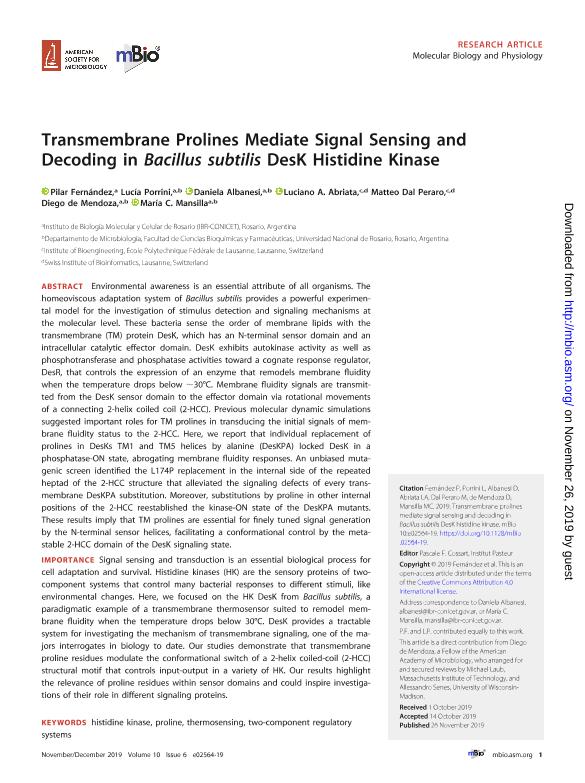Artículo
Transmembrane prolines mediate signal sensing and decoding in bacillus subtilis desk histidine kinase
Fernandez, Pilar ; Porrini, Lucía
; Porrini, Lucía ; Albanesi, Daniela
; Albanesi, Daniela ; Abriata, Luciano Andres
; Abriata, Luciano Andres ; Peraro, Matteo Dal; de Mendoza, Diego
; Peraro, Matteo Dal; de Mendoza, Diego ; Mansilla, Maria Cecilia
; Mansilla, Maria Cecilia
 ; Porrini, Lucía
; Porrini, Lucía ; Albanesi, Daniela
; Albanesi, Daniela ; Abriata, Luciano Andres
; Abriata, Luciano Andres ; Peraro, Matteo Dal; de Mendoza, Diego
; Peraro, Matteo Dal; de Mendoza, Diego ; Mansilla, Maria Cecilia
; Mansilla, Maria Cecilia
Fecha de publicación:
11/2019
Editorial:
American Society for Microbiology
Revista:
mBio
ISSN:
2150-7511
Idioma:
Inglés
Tipo de recurso:
Artículo publicado
Clasificación temática:
Resumen
Environmental awareness is an essential attribute of all organisms. The homeoviscous adaptation system of Bacillus subtilis provides a powerful experimental model for the investigation of stimulus detection and signaling mechanisms at the molecular level. These bacteria sense the order of membrane lipids with the transmembrane (TM) protein DesK, which has an N-terminal sensor domain and an intracellular catalytic effector domain. DesK exhibits autokinase activity as well as phosphotransferase and phosphatase activities toward a cognate response regulator, DesR, that controls the expression of an enzyme that remodels membrane fluidity when the temperature drops below ∼30°C. Membrane fluidity signals are transmitted from the DesK sensor domain to the effector domain via rotational movements of a connecting 2-helix coiled coil (2-HCC). Previous molecular dynamic simulations suggested important roles for TM prolines in transducing the initial signals of membrane fluidity status to the 2-HCC. Here, we report that individual replacement of prolines in DesKs TM1 and TM5 helices by alanine (DesKPA) locked DesK in a phosphatase-ON state, abrogating membrane fluidity responses. An unbiased muta-genic screen identified the L174P replacement in the internal side of the repeated heptad of the 2-HCC structure that alleviated the signaling defects of every transmembrane DesKPA substitution. Moreover, substitutions by proline in other internal positions of the 2-HCC reestablished the kinase-ON state of the DesKPA mutants. These results imply that TM prolines are essential for finely tuned signal generation by the N-terminal sensor helices, facilitating a conformational control by the meta-stable 2-HCC domain of the DesK signaling state. IMPORTANCE Signal sensing and transduction is an essential biological process for cell adaptation and survival. Histidine kinases (HK) are the sensory proteins of two-component systems that control many bacterial responses to different stimuli, like environmental changes. Here, we focused on the HK DesK from Bacillus subtilis, a paradigmatic example of a transmembrane thermosensor suited to remodel membrane fluidity when the temperature drops below 30°C. DesK provides a tractable system for investigating the mechanism of transmembrane signaling, one of the majors interrogates in biology to date. Our studies demonstrate that transmembrane proline residues modulate the conformational switch of a 2-helix coiled-coil (2-HCC) structural motif that controls input-output in a variety of HK. Our results highlight the relevance of proline residues within sensor domains and could inspire investigations of their role in different signaling proteins.
Palabras clave:
HISTIDINE KINASE
,
PROLINE
,
THERMOSENSING
,
TWO-COMPONENT REGULATORY SYSTEMS
Archivos asociados
Licencia
Identificadores
Colecciones
Articulos(IBR)
Articulos de INST.DE BIOLOGIA MOLECULAR Y CELULAR DE ROSARIO
Articulos de INST.DE BIOLOGIA MOLECULAR Y CELULAR DE ROSARIO
Citación
Fernandez, Pilar; Porrini, Lucía; Albanesi, Daniela; Abriata, Luciano Andres; Peraro, Matteo Dal; et al.; Transmembrane prolines mediate signal sensing and decoding in bacillus subtilis desk histidine kinase; American Society for Microbiology; mBio; 10; 6; 11-2019; 1-15
Compartir
Altmétricas



